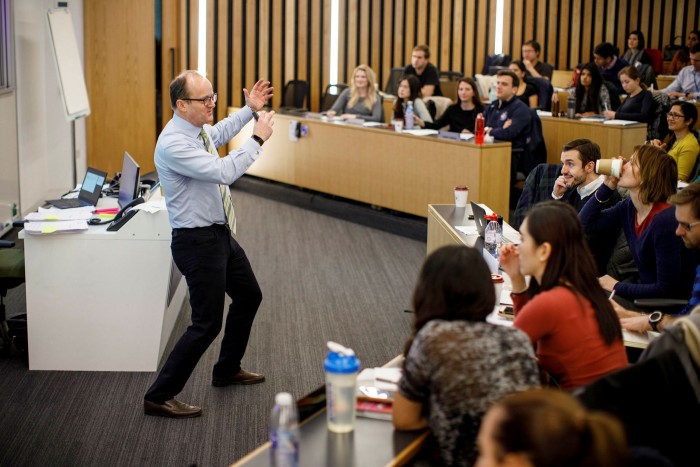Masters in Management adapt to rising demand and changing values
-48c8068c-da37-44f4-af62-8234187aadc9.png%3Fsource%3Dnext-article%26fit%3Dscale-down%26quality%3Dhighest%26width%3D150%26dpr%3D2?source=next-article&fit=scale-down&quality=highest&width=150&dpr=2)

Roula Khalaf, Editor of the FT, selects her favourite stories in this weekly newsletter.
Students around the world completing undergraduate courses during the pandemic are facing an uncertain job market. Many have postponed their search for employment, opting instead for what some have called “panic masters” or a second “degree of desperation”.
Masters in management (MiM) degrees may be the result of a more considered and rational choice than most — more a “deferral degree” to foster deeper knowledge and greater work-readiness. But they have not been excluded from the surge in interest. Applications to some of the better business schools are up a third or more on pre-Covid-19 levels.
That is good news for the institutions, which have spent months adapting and worrying about whether a mixture of travel restrictions and a switch to online teaching would depress demand for their courses and squeeze income.
But rising demand is more stressful for applicants, who face fiercer competition than usual for places on courses, coupled with the prospect of additional tuition fees and other debts to pay off, as well as more candidates vying for jobs on graduation.
In this Masters in Management Ranking 2021 report, we offer advice from admissions staff: prepare well in advance, start now to build evidence of leadership and community activities, seek internships and work experience, develop skills such as languages to stand out, and research the different courses available.
FT Masters in Management ranking 2021 — top 100

Find out which schools are in our ranking of Masters in Management degrees. Learn how the table was compiled and read the rest of our coverage at www.ft.com/mim.
Our ranking can help. It showcases 100 courses at leading business schools. Europe continues to dominate as the home of the degree, but North America and Asia are increasingly offering alternatives as they target the growing market for students with little professional experience.
There are strong common denominators between courses but also important distinctions, including cost, duration, specialisms, internships, teaching style, gender mix and the blend of international students and faculty. Some MiMs offer partnerships with other institutions, providing the chance to study and work in different countries during the degree and, in some cases, to earn an additional qualification. Hence we urge readers to analyse the individual data points most relevant to them at each institution, rather than focusing rigidly on the aggregate position of a school in any one year — not least during such a turbulent period.
Overall, the rankings offer reassurance for applicants who win places. Employment prospects three months after graduating from the leading schools we analyse remain high, and their alumni report strong levels of satisfaction in achieving their aims. Despite the disruptions and lay-offs triggered by Covid-19, they report higher average salaries in 2021, compared with 2020, and a significant increase in earnings in the three years since they completed courses.
Alongside the longstanding favourite employment options for those with a MiM — consulting, banking and finance — jobs in sectors that thrived during the pandemic have grown significantly, such as ecommerce, marketing and supply chains.
Among the key themes for employers and students alike, there is a growing appetite for courses that build an understanding of digital skills, including coding and data visualisation. That has led some enterprising students to create related start-ups, even while still on their course.
The pandemic has triggered a broader questioning of purpose and values, reflected in a surge in demand for jobs in the health sector, including roles in management as well as clinical and research positions. It has also sparked interest in management techniques in aspects of work that have become more prominent, such as how to cope with personal wellbeing and motivating and leading when teams are working remotely and customers and suppliers are increasingly operating online.
In the build-up to the UN COP26 climate change conference in the UK in November, sustainability is also frequently cited by students as a personal concern and a career interest. This issue is explored in a briefing by Diane-Laure Arjaliès, an associate professor at Ivey Business School in Canada and winner of the 2021 teaching recognition award for overall excellence in sustainable finance education, jointly awarded by the Financial Times and the Impact and Sustainable Finance Faculty Consortium.
Arjaliès cautions that stock markets will find it more difficult to adapt to the growing biodiversity crisis than they did to the 2008 financial crisis. But there is hope from the emerging field of conservation finance, which requires innovative approaches such as the need to form partnerships with indigenous peoples.
Much of the focus with sustainability has been on environmental issues, but we also explore the development of human rights in business: something companies are being forced to take into account in response to pressure from investors and regulators.
For students and recruiters alike, the best MiM courses will select and train in both technical skills and human values.
Andrew Jack is the FT’s global education editor
Comments